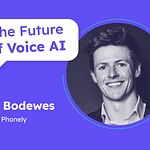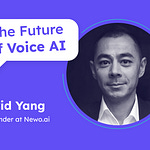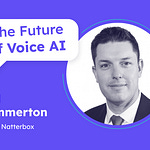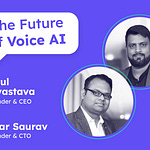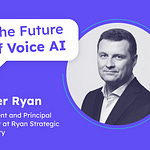In The Future of Voice AI series of interviews, I ask three questions to my guests:
- What problems do you currently see in Enterprise Voice AI?
- How does your company solve these problems?
- What solutions do you envision in the next 5 years?This episode’s guest is John Robb, Head of GTM and CX at Tenyx.
John (JR) leads Go-to-Market and Customer Success at Tenyx. John has GTM experience building AI, B2B, and open source companies all built with product-led growth (PLG). Previously, JR was the General Manager of R&D for Collaboration Products at VMware and the General Manager of Document Collaboration at Dropbox. Additionally, JR joined Elastic to lead and build their global partnership team and was part of the leadership team that led Elastic to an IPO. JR holds a B.S. and a B.A. from Northwestern University. JR also has an M.B.A. from the University of Chicago.
Tenyx delivers AI voice agents that automate voice customer experiences and services for the enterprise. By harnessing their market leading LLM, available on Hugging Face, and other voice-related AI elements, Tenyx allows customers across multiple industries to dramatically increase conversions, qualify leads, and reduce operating costs, all while vastly improving revenue, service levels, and overall customer experience. Tenyx creates services that are naturally engaging, capable of understanding context, and able to offer the sense of immediacy found in human interactions.
Recap Video
Takeaways
Tenyx recently published, "AI Bots Risk Customer Loyalty; Human Agents Still Preferred to AI Voice Agents," a survey to 500+ US consumers to understand sentiments toward AI voice agents. The survey had three big takeaways:
Customers are not happy with current state of automation
Humans are not always the right answer for support
Customers will abandon calls and try again until they get the support they want
Tenyx’s approach involves three components:
Developing core AI
Building voice-specific technology
Bringing it all together to deliver a natural and authentic user experience
AI systems must focus on more than speed, including understanding pauses, interruptions, and background noise.
Latency improvements in AI are important, but sometimes systems may need to slow down for better interaction quality.
People are disappointed with the current state of automation, presenting both a problem and creating an opportunity for innovation.
Many current automated systems are based on outdated, 10+ year-old technology and customers expect more.
Automated solutions and deployment should deliver immediate benefits to both businesses and customers.
Technologists must avoid trying to do too much, too soon in AI development.
AI deployment should start small and gradually expand to be successful.
Striking a balance between innovation and practical application is crucial for successful AI deployment.
Consumer frustration likely lies more with outdated, inadequate tech than lack of human touch.
Consumers prefer human agents but are frustrated by long wait times and agents’ inability to understand accents.
Perfectly functioning automation should connect users to human agents as quickly as possible, and enable humans to be super agents once connected.
Effective AI agents should quickly address the top 10 customer queries and deliver needed information fast.
Over the next five years, AI will increasingly remember preferences, leading to smoother and more personalized interactions.
Fully conversational AI agents will reduce or eliminate wait times, massively improving customer experience.






